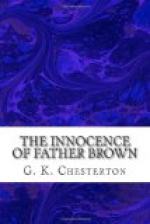And he took off the queer round hat covered with green, showing that it was lined within with steel. Wilfred recognised it indeed as a light Japanese or Chinese helmet torn down from a trophy that hung in the old family hall.
“It was the first hat to hand,” explained his brother airily; “always the nearest hat—and the nearest woman.”
“The blacksmith is away at Greenford,” said Wilfred quietly; “the time of his return is unsettled.”
And with that he turned and went into the church with bowed head, crossing himself like one who wishes to be quit of an unclean spirit. He was anxious to forget such grossness in the cool twilight of his tall Gothic cloisters; but on that morning it was fated that his still round of religious exercises should be everywhere arrested by small shocks. As he entered the church, hitherto always empty at that hour, a kneeling figure rose hastily to its feet and came towards the full daylight of the doorway. When the curate saw it he stood still with surprise. For the early worshipper was none other than the village idiot, a nephew of the blacksmith, one who neither would nor could care for the church or for anything else. He was always called “Mad Joe,” and seemed to have no other name; he was a dark, strong, slouching lad, with a heavy white face, dark straight hair, and a mouth always open. As he passed the priest, his moon-calf countenance gave no hint of what he had been doing or thinking of. He had never been known to pray before. What sort of prayers was he saying now? Extraordinary prayers surely.
Wilfred Bohun stood rooted to the spot long enough to see the idiot go out into the sunshine, and even to see his dissolute brother hail him with a sort of avuncular jocularity. The last thing he saw was the colonel throwing pennies at the open mouth of Joe, with the serious appearance of trying to hit it.
This ugly sunlit picture of the stupidity and cruelty of the earth sent the ascetic finally to his prayers for purification and new thoughts. He went up to a pew in the gallery, which brought him under a coloured window which he loved and always quieted his spirit; a blue window with an angel carrying lilies. There he began to think less about the half-wit, with his livid face and mouth like a fish. He began to think less of his evil brother, pacing like a lean lion in his horrible hunger. He sank deeper and deeper into those cold and sweet colours of silver blossoms and sapphire sky.
In this place half an hour afterwards he was found by Gibbs, the village cobbler, who had been sent for him in some haste. He got to his feet with promptitude, for he knew that no small matter would have brought Gibbs into such a place at all. The cobbler was, as in many villages, an atheist, and his appearance in church was a shade more extraordinary than Mad Joe’s. It was a morning of theological enigmas.
“What is it?” asked Wilfred Bohun rather stiffly, but putting out a trembling hand for his hat.




